Following the right-wing coup in Bolivia and the resignation of Evo Morales, the governments and people of several Latin American countries have let their thoughts and opinions be heard. One of the main countries voicing their opinion is Mexico, which granted Morales political asylum following his coerced resignation by the military in an order to return the country to peace. A Mexican Air Force G550 was sent Monday morning to pick up Morales in a proactive effort, not a reactive effort. There was uneasiness in the journey because the plane took off from Lima, Peru it was not allowed to land in Bolivia and had to return and wait for hours. After Morales was picked up, the plane was not able to refuel in Peru “due to political evaluations.” The plane was then able to land in Paraguay after a discussion between Argentina’s President-elect Alberto Fernandez and Paraguay’s President Mario Abdo. Following his departure, Morales tweeted “Sisters and brothers, I am leaving towards Mexico… It hurts to leave the country for political reasons; however, I will always be watching. Soon I will return with more strength and energy.”
Many left-leaning Latin American governments have expressed their thoughts that this was coup, while right-leaning governments like the US and the UK have expressed this as a return to democracy. Nicaragua’s left-leaning president Daniel Ortega has called this a coup and shows his unwavering support for Morales. Argentina’s foreign minister agrees with the recommendation from the OAS about holding new elections, but its President-elect Alberto Fernandez describes what has been happening a coup, saying “It was a coup perpetrated against the president who had called for a new electoral process”. There have even been huge protests in Buenos Aires against the coup. Venezuela’s Maduro condemned this suspected coup and added his support for the Native Bolivian people who he calls “victims of racism,” while Juan Guaido describes this as a continuation of the “democratic hurricane in Latin America”. Cuba has also called this a coup. Countries with more center and/or right-leaning governments have not called this a coup, but do call for a peaceful transition and process, these countries include Chile, Peru, Colombia, and Brazil.
Latin America as a whole is portrayed differently in all the articles I looked at. It depends on which news site, but these sites seem more or less neutral and just reporting on an event that could be considered a coup or not, which also depends on which government leader people are asking. This is very important to our class discussion because Latin America has a lengthy history of right-wing coups that have taken out democratically elected governments. We are seeing history in the making, and a history that has clearly repeated itself. 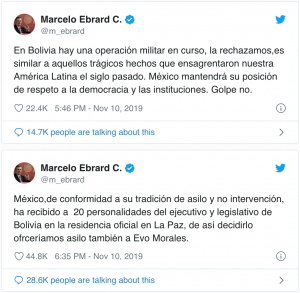
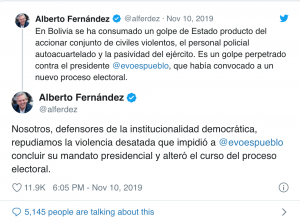
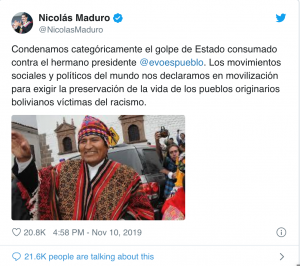
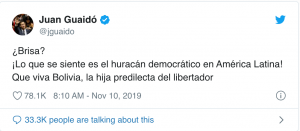
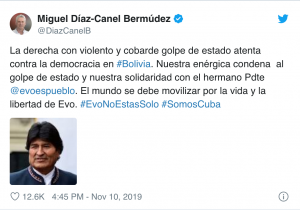
Sources
- https://www.telesurenglish.net/news/Bolivias-Evo-Morales-Lands-In-Mexico-As-A-Political-Refugee-20191112-0005.html
- https://www.aljazeera.com/news/2019/11/mexico-grants-asylum-bolivia-evo-morales-191111232118741.html
- https://www.cnn.com/2019/11/13/americas/bolivia-political-unrest-intl-hnk/index.html
- https://www.telesurenglish.net/news/massive-mobilization-in-buenos-aires-against-coup-in-bolivia-20191112-0021.html
